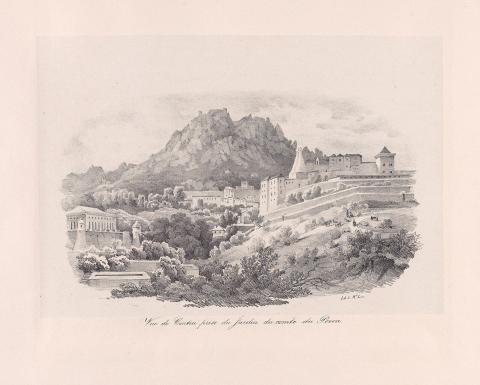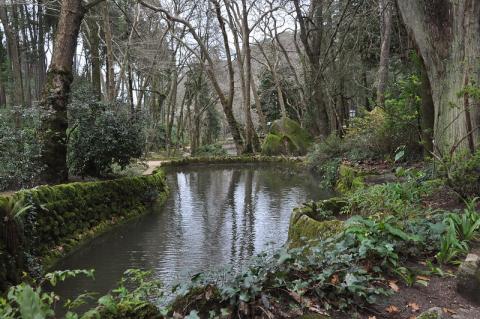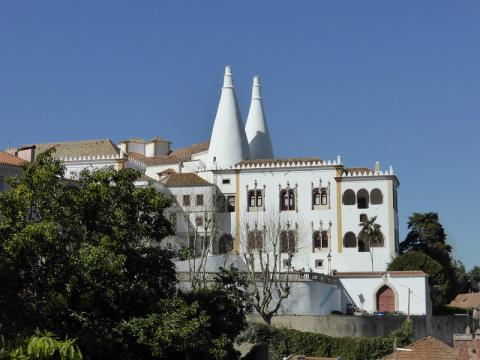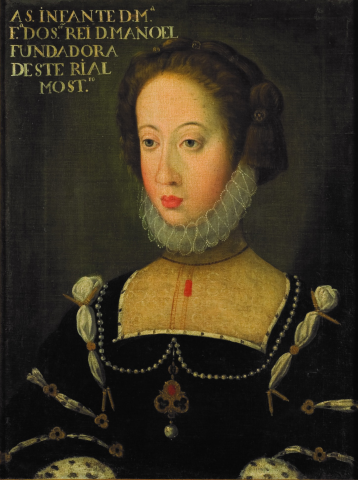Hīc Philomēla canit, turtur gemit atque columba;
nīdificant volucrēs, quotquot ad astra volant, 30
silva avium cantū resonat, flōrentia subtus
prāta rosās pariunt, līliaque et violās,
frāgrantemque thymōn, mentam, rōremque marīnum,
narcyssum et neptam, bāsylicumque sacrum:
atque aliōs flōrēs, rāmōs herbāsque virentēs, 35
terra creat pinguis vallibus ac nemore:
quīs passim Dryadēs capitī cīnxēre corōllās,
et Faunī et Nymphae cornigerīque deī.
Ast ubi praecipitāns lēnī fluit unda susurrō
per vallem umbrōsam rūpibus aeriīs, 40
stāgna replet, pulchrae mersant ubi corpora nymphae,
aurōra aut splendet, seu tegit umbra polum.
Rēgia celsa lacū superēminet, unde comantem
prōspectat silvam candida virginitās.
notes
There are many types of songbirds, roses, lilies, herbs, and other flowers which dryads, fauns, and nymphs wear as garlands. There is a stream-fed pool in which the nymphs swim. Above it all stands the Palace of Sintra.
29 Philomēla: "the nightingale," into which the mythological character Philomela was transformed.
29 gemit: this verb is often used of birds or other animals that make a noise that to human sounds mournful. See OLD gemo 2. The subjects are turtle doves and doves (supply gemit again after columba), so perhaps, "coos" or "purrs."
30 quotquot: "as many as."
31 avium: genitive plural after cantu, “with the song of birds.”
31 flōrentia: neut. acc. pl., agreeing with prāta in the next line.
31 subtus: adverbial “down below.”
32 que et: the extra connective is common with paired terms (noctesque et dies, "night and day," mariaque et terras "seas and lands"). They may, but need not be, rendered as “both…and….”
32 prāta: subject of pariunt.
33 frāgrantemque thymōn: these direct objects are all governed by terra creat in line 36. The -que here separates these direct objects from the earlier direct objects of pariunt.
33 rōrem marinum: same as rosmarinum, “rosemary.” Rosemary gets its name either from the fact that it grows near the ocean, or that it very seldom needs to be watered.
34 neptam: = nepetam, "catnip," or possibly "lesser calamint" (Clinopodium nepeta). Lesser calamint is common in Portugal and can be used to brine olives.
34 bāsilicumque sacrum: holy basil, Ocimum tenuiflorum.
36 terra creat: take the previous herbs as the direct objects.
36 pinguis: "fertile" (LS pinguis I.B.1).
36 vallibus ac nemore: ablatives of place where, “in its valleys and grove(s).”
37 quīs: = quibus "with which" (referring to the flowers in the previous line). See LS qui.
37 passim: "here and there," "all over the place," answered by ast ubi in line 39.
37 capitī: singular rather than the expected plural, “for their head(s).”
37 Cinxēre: = cinxerunt. Take together with corōllās, “they have crowned garlands.”
38 cornigerīque deī: "the horned gods," presumably satyrs, who in some depictions acquire goat-like characteristics.
39 ast: = at.
39 praecipitāns lēnī fluit unda susurrō: order: praecipitans unda fluit lēnī susurrō: “cascading water flows with a gentle murmur.” Lēnī susurrō is an ablative of manner.
40 rūpibus aeriīs: "from sky-high crags," ablative of place from which.
41 mersant: "might submerge," potential subjunctive (AG 447.3). Pulchrae Nymphae are the subject.
42 Aurōra aut splendet, seu tegit umbra polum: supply ubi = "when(ever)" + indic., as normally (LS ubi II.A.1). Aurōra aut splendet, seu tegit umbra polum: “either (when) Aurora shines, or when the shadow covers the sky.” Aut ... seu = aut ... aut, “either…or…”
43 regia celsa: “a lofty palace," that is, the Palace of Sintra (Palácio de Sintra) near Lisbon, Portugal. Originally built by the Moors in the Al-Andalus era, the existing palace is mainly the result of building campaigns in the 15th and early 16th centuries, especially by King Manuel I (1495-1521).
43 lacū superēminet: lacū is dative (AG 89) with superēminet, “hangs over the lake,” “juts out over the lake.”
43 comantem: "leafy" (LS como I. B). Comantem silvam the direct object of prōspectat.
44 candida virginitās: "the fair virgin (princess)," i.e. Maria of Portugal, the Duchess of Viseu, the patron and employer of the author. She is referred to variously as principis almae (54), regia virgo (61), principis augustae (78), and maxima princeps (97). virginitas = virgo is rare, but occurs in the late antique historian Ammianus Marcellinus 31.8.8.
- Read more
-
"Maria was born in 1521, to the King, Manuel I of Portugal, and his third wife, the Arch-Duchess Eleanor of Austria. Maria’s father died only six months after her birth. Her mother remarried and left the kingdom for France three years later; she was forced to leave her daughter behind. Therefore, from the age of four, the Infanta was left with only her eldest brother, the new King João (John) III. She was the heiress to a large part of her father’s fortune and, later, her mother’s. This enormous combined fortune was one of the main reasons why she was not allowed to leave the country, despite her mother’s attempts to take her. It was also, later, one of the main reasons why (despite being one of the most eligible princesses in the European Royal Houses and having been considered as a potential bride by almost all of them, including the English king Henry VIII) she never married. Known as ‘the eternal bride’, from 1537 onwards the Infanta Maria established a court for herself and lived as a great Renaissance princess. Here the Infanta surrounded herself with all sorts of humanists, writers, and artists. As a court headed by a woman, it was particularly appealing to women scholars and gave them a chance to be paid for their services. Sigea taught Latin to the Infanta and was paid 16,000 reis per year, an amount superior to that received by other chambermaids. At court Luisa had access to the royal library and could dedicate herself to her literary pursuits." Sofia Frade, “Hic sita Sigea est: satis hoc: Luisa Sigea and the Role of D. Maria, Infanta of Portugal, in Female Scholarship,” in Women Classical Scholars: Unsealing the Fountain from the Renaissance to Jacqueline de Romilly, ed. Rosie Wyles and Edith Hall (Oxford: Oxford University Press, 2016), pp. 52-53.
vocabulary
Philomēla (Philemēla) –ae f.: Philomela, a daughter of Pandion, changed into a nightingale
turtur –uris m.: a turtle-dove
gemō gemere gemuī: to groan, sigh, coo
columba –ae f.: pigeon, dove
nīdificō –āre: to build a nest 30
quotquot: indecl. adj., whatever number, as many as
volō volāre volāvī volātus: to fly
cantus –ūs m.: a song
resonō resonāre resonāvī resonātus: to sound again, resound, ring, reecho
flōreō flōrēre flōruī: to flourish, blossom, bloom
subtus: below, underneath, in a position lower than
prātum prātī n.: meadow; field, plain
rosa rosae f.: rose
līlium –iī n.: a lily
viola –ae f.: a violet
fragrō fragrāre fragrāvī fragrātus : to be fragrant, redolent, sweet-smelling
thymum –ī n.: the herb thyme
menta (mentha) –ae f.: mint
rōs rōris m.: dew
marīnus –a –um: of the sea (> mare)
narcissus –ī m.: narcissus (flower)
rāmus rāmī m.: branch 35
herba herbae f.: grass, herb
vireō virēre viruī: to be green or verdant; be lively or vigorous; be full of youthful vigor
pinguis pingue: fat, rich, fertile
vallēs vallis f.: valley
passim: here and there, indiscriminately
dryas –adis f. : a Dryad, wood-nymph
corolla –ae f.: garland, small wreath (dim. of corona)
Faunus –ī m.: Faunus, the tutelary god of husbandmen, identified by the Romans with the Greek Pan; (in pl.) country deities, identified with (Greek) Satyrs
nympha –ae (nymphē –ēs) f.: nymph, demi-goddess inhabiting water or other natural places
corniger –era –erum: horn–bearing; horned (> cornu and gero)
praecipitō praecipitāre praecipitāvī praecipitātus: to send headlong, throw down; cascade
lēnis –e: gentle, kind, mild
susurrō susurrāre susurrāvī susurrātus: to whisper, murmur
vallēs vallis f.: valley
umbrōsus –a –um: shady; dark, shadowy (> umbra)
rūpēs –is f.: a rock, cliff, crag, ledge
āerius –a –um: airy, towering, lofty 40
stagnum stagnī n.: pool, pond
repleō –ēre –plēvī –plētus: to fill up, fill
mergō –ere mersī mersus: to dip, immerse, plunge
aurōra aurōrae f.: the dawn, morning; personified, Aurora, the goddess of the dawn, who precedes the horses of the sun–god; the east; the sun
splendeō –ēre –uī: to shine, gleam
polus –ī m.: the celestial pole; (meton.), the heavens, sky; air
rēgia -ae f.: royal residence, palace
celsus –a –um : high, lofty, et al. (> cello, rise)
lacus lacūs m. : lake; cistern, reservoir
superēmineō –ēre : to stand out above, project over (+ dat.)
cōmāns -ntis: leafy, having foliage
prōspectō prōspectāre prōspectāvī prōspectātus: to look out upon, (of a place) afford a view of
virginitās –ātis f.: virginity (> virgo)




